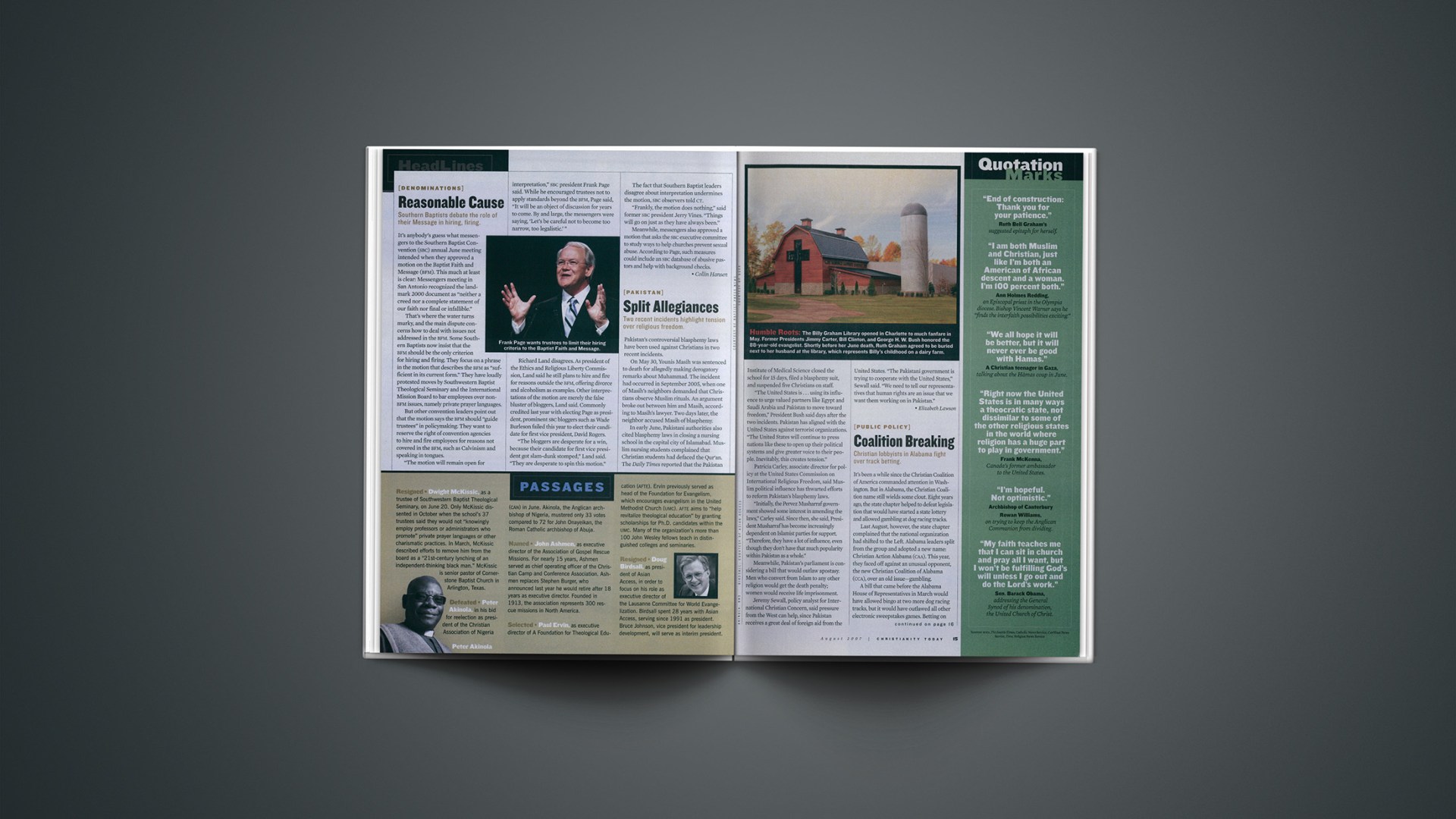It’s been a while since the Christian Coalition of America commanded attention in Washington. But in Alabama, the Christian Coalition name still wields some clout. Eight years ago, the state chapter helped to defeat legislation that would have started a state lottery and allowed gambling at dog racing tracks.
Last August, however, the state chapter complained that the national organization had shifted to the Left. Alabama leaders split from the group and adopted a new name: Christian Action Alabama (CAA). This year, they faced off against an unusual opponent, the new Christian Coalition of Alabama (CCA), over an old issue—gambling.
A bill that came before the Alabama House of Representatives in March would have allowed bingo at two more dog racing tracks, but it would have outlawed all other electronic sweepstakes games. Betting on races at the state’s four dog tracks is allowed, and two tracks offer electronic bingo. Since the Alabama constitution forbids games of chance, excluding charitable bingo games, former CAA president John Giles argued that the legislation is unnecessary. His side prevailed as House supporters failed to muster a three-fifths majority.
But Randy Brinson, appointed last December as president of the CCA, supported the bill. He argued that expanding betting at two more tracks would actually help Christians fight gambling. Without consistent legislation, Brinson said, Christians could face battles with many sweepstakes machines, rather than a few dog track owners.
“These people are willing to make concessions, willing to be taxed,” Brinson said. “It’s a give-and-take thing, and it makes a lot of sense.”
The policy debate turned ugly when the House bill stalled and Brinson filed suit against Giles, accusing him of trying to destroy the Christian Coalition of Alabama. The suit, filed by one of the state’s premier litigators, charged Giles with stealing the coalition’s website and constituent mailing lists.
“They wanted our assets so they could go out and promote a gambling bill,” Giles said. “We have a standing policy that we don’t rent, sell, or give away our list to anyone. It’s the property of the organization that is overseen by the board.”
But Brinson said the www.ccbama.org website and the mailing lists should be the property of the Christian Coalition.
“If you’re going to leave, then make a clean break and start over,” Brinson said. “Don’t use the assets you obtained while you were with the Christian Coalition to support another entity.”
The suit also alleged that Giles received laundered money from the Mississippi Choctaw Indian Tribe to fight against the Alabama lottery in 1999. Citing newspaper articles, the suit laid out ties between the tribe and Ralph Reed, former president of the Christian Coalition of America. It traced the flow of $850,000 from the tribe through Americans for Tax Reform to the Christian Coalition of Alabama. Giles denies knowing that the donation came from an Indian tribe.
Brinson dropped the lawsuit in May at the request of the Christian Coalition of America. He and Giles met June 25 and said they hope to work together in the future to promote ideas that will serve the entire Christian community.
Copyright © 2007 Christianity Today. Click for reprint information.
Related Elsewhere:
The Christian Coalition and Christian Action Alabama have posted their views on the Alabama gambling legislation.
Brinson told the Associated Press that he dropped the suit because it was giving the CCA such bad press.
Related articles include:
Religious lobbyists echo the cry: ‘Show me the money’ | What do you call it when one lobbyist sues another? Coalition contention. (Huntsville Times)
Christian Coalition split gets wider | New leader sues old leader, claiming assets were taken (Associated Press)
Full disclosure a cure for bad press | If the new leader of the Christian Coalition of Alabama understands the negative effect of bad publicity, perhaps he will support making the organization financially transparent. (The Decatur Daily)
Alabama Christians call a truce | We haven’t heard much lately from the political arm of the state’s Religious Right. Mainly this is because members and their leaders have spent more time protecting their turf and fighting each other than they have waging war against secular sinners—real and imagined. (The Anniston Star)










